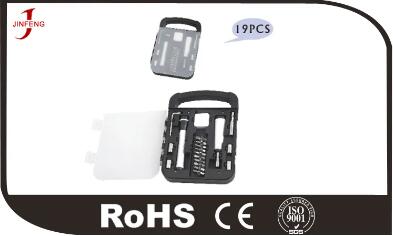Building Your First Mechanics Tool Set: The Must-Have Essentials
2024-08-10
If you’re new to the world of mechanics or looking to build your first tool set, it’s important to understand what tools are essential and why. A mechanics tool set is an investment that can save you time and money, whether you’re working on your car, bike, or household repairs. In this blog, we’ll guide you through the must-have tools that should be included in your first mechanics tool set.
1. Socket Set: The Foundation of Your Tool Kit
The socket set is the foundation of any mechanics tool kit. It consists of various sockets that fit over nuts and bolts, along with a ratchet handle that allows you to apply torque. For beginners, a set with both metric and SAE sizes is ideal, as it covers a wide range of fasteners you’ll encounter in automotive and household projects. Start with a 3/8-inch drive set, which offers a good balance between size and versatility.
2. Combination Wrenches: Versatility in a Single Tool
Combination wrenches are a must-have for any tool set. These wrenches feature an open end for quick adjustments and a box end for a secure grip on fasteners. They’re available in both metric and SAE sizes, so having a set of each will ensure you’re prepared for any job. Combination wrenches are particularly useful for tightening or loosening nuts and bolts in tight spaces where a socket wrench might not fit.
3. Screwdrivers: The Go-To Tools for Many Tasks
Screwdrivers are essential tools for a wide range of tasks, from assembling furniture to fixing electronics. A basic set should include both flathead and Phillips screwdrivers in various sizes. Look for screwdrivers with ergonomic handles that provide a comfortable grip, as this will make it easier to apply the necessary force without straining your hand. Magnetic tips are also a handy feature, as they help prevent screws from falling out of the driver.
4. Pliers: Grip and Precision in One Tool
Pliers are indispensable in any mechanics tool set. A standard set should include needle-nose pliers, slip-joint pliers, and locking pliers. Needle-nose pliers are ideal for precision work in tight spaces, while slip-joint pliers can adjust to different sizes of fasteners. Locking pliers, also known as Vise-Grips, are great for holding objects securely in place while you work.
5. Hex Keys (Allen Wrenches): Small Tools with Big Impact
Hex keys, or Allen wrenches, are small but mighty tools used for driving bolts and screws with hexagonal sockets. They’re commonly needed for assembling bikes, furniture, and machinery. A set of hex keys in both metric and SAE sizes will ensure you’re prepared for any project. These tools are often stored in a compact, foldable set, making them easy to carry and store.
6. Torque Wrench: Precision for Critical Fasteners
While not always included in basic sets, a torque wrench is an important tool for ensuring that fasteners are tightened to the correct specification. Over-tightening can damage threads, while under-tightening can lead to parts coming loose. A torque wrench allows you to apply the exact amount of force needed, which is especially important in automotive work and machinery assembly.
7. Extension Bars and Adapters: Reach and Flexibility
Extension bars and adapters enhance the versatility of your socket set. Extension bars allow you to reach fasteners in deep or hard-to-access areas, while adapters enable you to use different drive sizes together. These tools are essential for working on engines or other complex assemblies where space is limited.
8. Hammers and Mallets: Force Without Damage
Hammers and mallets are often overlooked but are essential tools in a mechanics tool set. A ball-peen hammer is useful for shaping metal and driving pins, while a rubber mallet can be used to apply force without damaging surfaces. These tools are particularly handy for tasks like fitting parts together or removing stubborn components.
9. Utility Knife: The Everyday Essential
A utility knife is a versatile tool that’s used for cutting through materials like rubber, plastic, and insulation. It’s a go-to tool for a wide range of tasks, from trimming hoses to opening packages. A retractable blade and a comfortable grip make a utility knife a valuable addition to any tool set.
10. Measuring Tools: Accuracy Matters
Precision is key in mechanical work, which is why measuring tools are an essential part of your tool set. A tape measure, calipers, or a ruler can help you ensure that parts are cut, aligned, and fitted correctly. Accurate measurements prevent costly mistakes and ensure a professional finish to your projects.
Conclusion
Building your first mechanics tool set is an exciting step toward becoming more self-sufficient and capable in handling repairs and projects. By including these essential tools in your set, you’ll be well-prepared to tackle a wide range of tasks, from automotive repairs to household maintenance.



